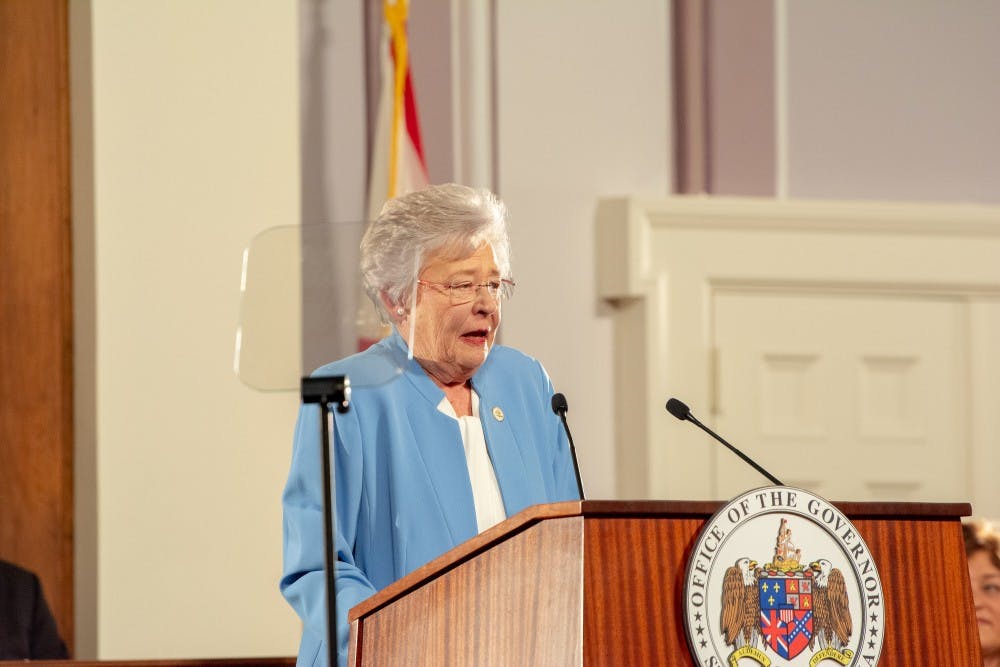On March 4, Gov. Kay Ivey extended the statewide health order with some modifications through April 9. The mask mandate will stay in effect, but Ivey said it will be removed after April 9.
Moving forward, senior centers will be able to hold more activities, as Ivey stated that senior citizens have been affected by loneliness and depression throughout the pandemic.
Alabama State Health Officer Dr. Scott Harris said that nursing homes and senior centers also have federal restrictions placed on them, not just from the state.
Restaurants will be allowed to seat more patrons, Ivey said. Hospitals and nursing homes will up the number of visiting family members from one to two. Summer camps will be in session this summer as well.
“There is no question that wearing masks has been one of our greatest tools in combatting spread of the virus,” Ivey said. “Even when we lift the mask order, I will continue to wear my mask when I’m around others and strongly urge my fellow citizens to use common sense and do the same thing. But, at that time, it will become a matter of personal responsibility and not a government mandate.”
Ivey reminded citizens that businesses have the next five weeks to prepare their own policies for masks once the government mandate ends.
Ivey said she believes the mask mandate was the correct decision to effectively combat the virus, but she does understand the opposition from those who believe the government took “a step too far in government overreach.” Those who do not want to wear masks or socially distance may not have access to the same information she has, she said.
As of Tuesday, Alabama was averaging 778 new COVID-19 cases per day, Ivey said. Alabama has seen an 82% drop since Jan. 10, now seeing numbers lower than what was seen in late June 2020.
“Y’all, [this is] definitely indication that we’re moving in the right direction, and I certainly want to thank the people of Alabama once again for their tremendous help and support to get us where we are,” Ivey said. “Even with this positive news, however, Dr. Harris and I are both convinced that we need to get past Easter and hopefully allow more Alabamians to get their first shot before we take the step some other states have taken to remove the mask order altogether and lift other restrictions.”
Ivey also announced that Alabama administered its one millionth vaccine shot on March 3. The first vaccines arrived in the state less than three months ago. She asked that people be patient when waiting for a vaccine, as the state is receiving them at a slower rate than they are being requested.
“Remember the inspiration of the golden rule,” Ivey said. “Look out for your friends and neighbors. If you’ve had your vaccine, think about an elderly friend or relative who might not be as savvy as you and give them a call to see if you can assist in getting them registered for their shot. Or, if you’ve got a car and they don’t, think about giving them a lift to one of the distribution sites in the area.”
Ivey thanked Alabamians for their personal responsibility in combatting the virus, as the actions of citizens are causing the downturn in cases.
Harris announced that Alabama has seen over 10,000 deaths due to COVID-19. On average, Alabama sees the deaths of 52,000 to 53,000 people per year, but 2020 saw “well over 64,000 deaths.” Harris stated the worst dates for deaths occurred in 2021, which do not factor into the 2020 number.
“That said, we do see some bright spots, finally,” Harris said. “Our hospitalization numbers are as good as they’ve looked since early summer and daily case numbers continue to improve.”
Harris said that Alabama will receive over 100,000 first dose vaccines next week, which is the highest number the state has seen. The vaccines are made by Moderna and Pfizer. The state expects to see 40,000 Johnson & Johnson vaccines next week as well, though it is a one-time shipment for the month of March.
Harris acknowledged that minority communities are at higher risk for COVID-19 and the state is working to make sure those communities have access to vaccines. Walmart will soon have over 120 stores administering vaccines and CVS Pharmacy will have over 60.
Harris said there have been cases of the United Kingdom's COVID variation in the state, but there is no widespread testing for it so there is not an accurate number for how many cases there may be of these strains. Over half a million Alabamians have been exposed to COVID, and they’re believed to have some level of immunity.
Do you like this story? The Plainsman doesn't accept money from tuition or student fees, and we don't charge a subscription fee. But you can donate to support The Plainsman.

Charlie Ramo, junior in aerospace engineering, is the content editor of The Auburn Plainsman.





